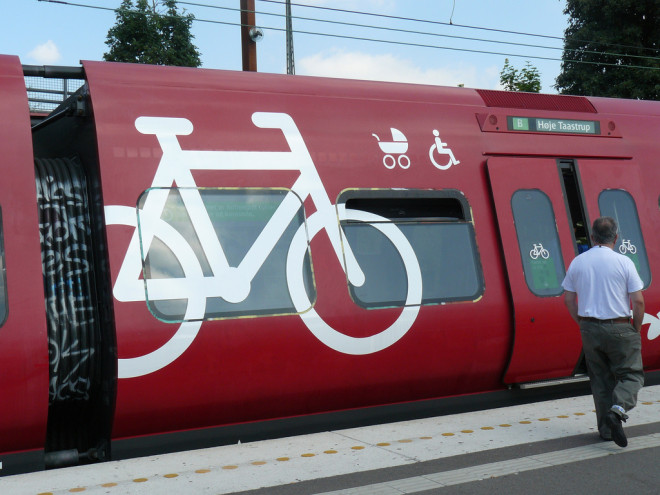
Back on track?: Bike carriage on long-distance train services
 Last week we presented our latest position paper on Bike & Trains to the major European railway companies. The paper brings together best practices from around Europe and aims to highlight the 7 basic services that all cycle tourists appreciate when trying to travel to and from their holiday destinations.
Last week we presented our latest position paper on Bike & Trains to the major European railway companies. The paper brings together best practices from around Europe and aims to highlight the 7 basic services that all cycle tourists appreciate when trying to travel to and from their holiday destinations.
We all know that cycle tourism is a booming sector but surprisingly it is one that the rail industry has not gone out of its way to encourage. The ECF published a position paper last April entitled ‘Bike and Train: A European Odyssey’, which was critical of both the rail industry’s approach towards bicycle carriage on long-distance rail services and the European legislation on the topic. We argued that the relevant Regulation (ECF 1371/2007) gave railways companies far too much wriggle room to get out of having to cater for cyclists and had not improved the carriage of bicycles on trains since its introduction. Partly as a consequence of this weak legislation but also due to the rail industry’s concentration on the business end of the long-distance market at the expense of other users, we concluded that the services offered were insufficient in terms of quality and quantity and – to make things worse – overall trends were pointing in the wrong direction.
The Community of European Railway and Infrastructure Companies (CER) holds a Customer Liaison Group Meeting twice a year, which is typically attended by representatives of companies such as DB, SNCF, SNCB, FSI and RENFE as well as other passenger groups. For the latest meeting, the ECF were asked to present recent developments with regards to EuroVelo, the European cycle route network, and our view on the carriage of bicycles on long-distance rail services.
Fortunately the situation has improved over the past 12 months and Ed was able to report that the next generation of IC trains in Germany will have spaces for 8 bikes and that the refurbished Railjet trains in Austria will allow for the carriage of 6 bikes and include charging points for electric bikes. As Ed commented: “There’s a still lot to be done but at least we are starting to move in the right direction now.”
Moreover, a recent review of the passenger’s rights Regulation undertaken by a consultancy employed by the European Commission agreed with our view that the wording of the existing legislation is so woolly that it does not make a difference. It challenged the Commission to either give it some teeth or take it out.
Of course it will take time for the legislation to change and so in the meantime the ECF is keen to work with the rail operators to develop services designed for European citizens that want to take advantage of the many benefits of combining bike and train. Ed explained “We see this as being mutually beneficial: for cycle tourists it is more convenient to use trains and it allows them to choose a sustainable travel option. For the rail operators, they get new customers from a growing sector of the tourism market and it can help to ‘green’ their image.”
“During the presentation we identified the 7 basic services that will remove barriers for people who want to combine the two modes of transport.”
The seven points being: cycle carriage on all trains; accurate information (online, in the station and on the train); accessibility; consistent pricing; reservations; bike parking at stations; and connections to cycle hire schemes.
We wanted to encourage the rail operators to help make it easier to take your bike on holiday and therefore we showed examples of good practice related to each point taken from across Europe.”
The presentation was well received and the ECF have been asked to present again its position and recommendations to an even larger audience of rail companies later in the year.
The ECF’s position papers on bike and train can be viewed here:
http://ecf.com/advocary/mobility/intermodality-bike-and-train-tram-tube-bus-ferry-plane/
 About the Author
About the Author
Ed Lancaster, ECF Policy Officer forRegional Policy & Cycling Tourism -For the past 7 years, Ed has worked as a Town Planner for various local authorities in South East England and he has a Master’s degree in Town Planning from the University of Westminster. In his last role he was responsible for transport policies and strategy, as well as managing numerous cycling-related projects (e.g. providing new cycle infrastructure and running promotional activities).
- Log in to post comments
Contact the author
Recent news!
Upcoming events
Contact Us
Avenue des Arts, 7-8
Postal address: Rue de la Charité, 22
1210 Brussels, Belgium









